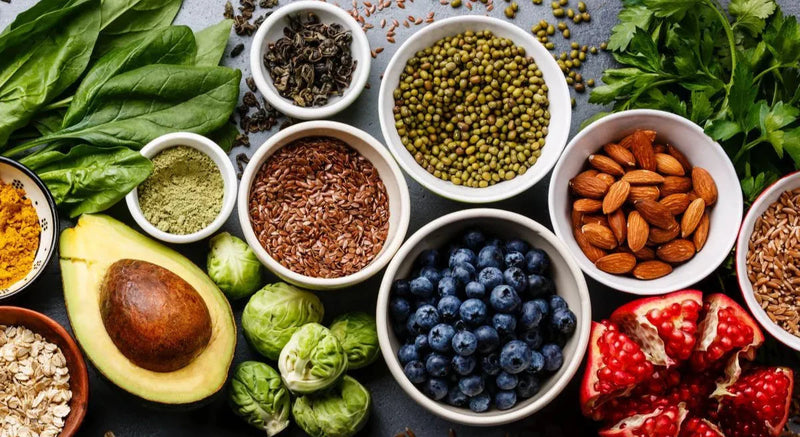Skincare of a Nutritionist
For most, a ‘skincare routine’ involves a twice daily, cleanse, tone and moisturise ritual. As an esthetician and nutritionists however, ‘skincare routine’ for me is not just what I apply to the skin topically but what I’m ‘feeding’ the skin with internally!
All those years of learning about the impact of diet on every single aspect of health mean that my skincare routine inevitably start with what I eat. So here’s a little peek into what goes into my day to support healthy skin:
Water
Start the day as you mean to go on with a mug of hot water and a slice of lemon. You need to drink at least 1.5 litres of fresh filtered water daily and getting a mug in early is the best way to cleanse your system to begin your day. Water keeps your skin cells plump and taut, supports healthy digestion and elimination and flushes out toxins too.
Having a glass bottle filled with water on your desk and always taking a bottle of water out with you can help to make sure you top up your fluid through out the day.
Essential Fats
Fat is a crucial part of skin cell membranes, helping to keep the cells that reach the epidermis (outer most layer) supple, smooth and able to retain moisture with in the deeper layers of skin.
Underneath the epidermis (and dermis layer) is the subcutaneous layer of fat that acts as a shock absorber for the skin, it adds extra cushioning to the skin much like collagen does.
Ensuring we include healthy fats to replenish and support both these aspects of the skin is important.
I add a variety of seeds including pumpkin, flax, sunflower and chia to my morning smoothie, along with some avocado which not only gives it a lush velvety texture, but contains beneficial monounsaturated fats, vitamins C and E and antioxidant-rich carotenoids, it’s a skin superfood.
I also mix equal amounts of these seeds (always grind flax, we cant break it down) and store in a glass jar in the fridge to sprinkle over salads, soups, porridge, granola or yogurt.
Oily fish such as salmon, mackerel, sardines provide the essential fatty acids omega 3 and omega 6. Both these fats play a crucial role in skin health in particular the structural integrity and barrier function of the skin. They also play a vital role in the inflammatory response in the skin.
Eating oily fish can help with many skin concerns including inflammation, acne, eczema, premature ageing eating. To support healthy skin I try to have it at least 3 times a week.
Rather than mayonnaise or other table sauces high in saturated fats or sugar, I use a variety of monounsaturated and polyunsaturated oils, such as sesame, flax seed and olive oils drizzled over salads and vegetables. I Infuse extra virgin olive oil with fresh herbs and leave in a dark cupboard for a few weeks to allow the herbs to impart their flavours into the oil, delicious drizzled over a simple vegetable pasta at lunch time.
Walnut oil is another favourite, this oil is rich in omega 3 and 6, antioxidants that support skin health. Studies have shown that walnut oil contains compounds that make up our own skin! It’s particularly beneficial for those with eczema and acne and it helps to speed up wound healing.
Protein
Our skin is in a constant state of rebuilding and repair, every 4-6 weeks (a little longer as we grow older) a new skin cell cycle starts, which needs constant nourishment and high quality protein.
Keratin is the main protein in the skin (it’s in hair and nails too). It is responsible for the rigidity of the skin, maintaining the skin barrier function. A compromised barrier will contribute to eczema, allow pathogens to enter the skin (adding to inflammation and breakouts) and allow moisture to escape, leading to dryness and premature ageing.
Below the surface layer of the skin is the dermal layer. 80% of this layer is made up of the protein Collagen, which provides a plump cushiony layer helping the skin to stay soft and unlined, protecting the skin from splitting when it is pulled and twisted. Elastin, is the protein that acts like a rubber band, allowing it to stretch and then ‘snap’ back into position.
Proteins are made from a varirety of amino acids which provide the building blocks for every single cell in our body, including skin cells.
Including quality protein in our diet ensures we are providing the building blocks for our skin cells, collagen and elastin. I try to include a little protein at every single meal, eggs, yogurt, beans, lentils, humous, fish, chicken.
I always add a spoonful of protein powder to my morning smoothie, I love Naturya Hemp Protein powder, as it’s also a source of many minerals including zinc which is a key component for healthy skin and wound healing, especially for acne prone skin.
I also use Hemp Protein in my ‘energy bites’ (recipe on my website) along with Raw Cacao to give me an energy boost and support the skin at the same time.
Antioxidants
Antioxidants are molecules that fight free radicals in the body. Free radicals are constantly formed in the body through normal everyday metabolic activity in the body.
We can be exposed to even greater levels through several lifestyle and environmental factors including cigarette smoke, alcohol, burnt food and high intakes of sugar.
Too many free radicals and damage can be done to our cells and even our DNA. Our skin cells and collagen fibres are easily damaged by free radicals which accelerates the ageing process.
Antioxidants are often present in skincare whether they’ve been an added ingredient or (more preferably) are naturally present in the plant oils and materials used. But by eating foods rich in antioxidants we can ensure our body has a better ability to fight free radicals and prevent excessive damage.
Vitamins A, C and E, the mineral Selenium and plant compounds such as carotenoids and flavonoids are the major antioxidants used by the body. Eating a ‘rainbow’ of colourful fruit and vegetables will provide a rich variety of these crucial substances.
I try to include at least 8 different proteins of vegetables and 2 of fruit every day. It might sound like a lot but your skin (and general health) will thank you. My breakfast smoothie, snacking on veg sticks, a salad with roasted veggies (and my seed mix) or soup at lunch time and a dinner with half the plate full of vegetables are some of the ways I try to make sure I’m getting as many antioxidants as possible.
My Skin Saviours
I’d love to say that these super skin foods all feature in my diet without fail every single day but I’m not perfect, life doesn’t always allow it! Some appear daily and others might feature only once, but for my skin’s sake, I’ll try to make sure I get them in every week.
Nuts and seeds, chia seeds, oily fish, raw cacao nibs, flaxseed oil, turmeric powder and fresh turmeric (if I can find it), fresh ginger, cinnamon, live organic yogurt, avocado, papaya, citrus fruits, butternut squash, leafy greens, broccoli, onions and garlic.
I take my skin supplements daily. These include vitamin C (to support collagen & elastin production), CoQ10 (protective antioxidant for skin, levels of which decrease with age), a good quality multi-vitamin (antioxidant’s and mineral support for skin and general health), omega 3 fish oil (essential fats to support hydration & healthy cell membranes).
There is a skin targeted supplement that is worth considering to support collagen, elastin and provide extra antioxidants. Biocare Collagen Complex contains not only marine collagen but hyaluronic acid, which is produced naturally in the body where it helps to retain water to keep skin tissues plump and moist and prevent tissue dehydration. Sadly like collagen, production decreases as we age, further contributing to dryness and lines.

Things to Avoid!
Whilst it’s important to feed your skin with nourishing and protective nutrients, it’s also crucial to reduce or avoid diet and lifestyle factors that can damage your skin. Here’s the things I know my skin doesn’t like that I try to keep in check; burnt or fried foods, exercising on busy roads (exhaust fumes), excessive exposure to sun’s UV rays, alcohol, caffeine, processed foods and refined sugar.
Like oxidative stress, sugar is very damaging to skin, via a process called glycosylation, where excess sugar attaches to proteins and prevents them from functioning properly. Collagen and elastin are proteins that are easily damaged by glycosylation and the skin can become saggy and wrinkled. Sugar also interferes with the way the body uses vitamin C, which is more bad news for collagen and elastin.
Skincare Products
The products we choose should support the natural functions of the skin and provide protection to it from the various daily ‘stressors’ it encounters. Our skin is alive, lifeless chemicals can not give life and vibrancy to it.
It is a common misconception that synthetic, lab-created ingredients are necessary to achieve positive results in skin care. Lab-made ingredients are cheaper than real plants and they cannot contain the nutrient content and vibrancy that Nature can deliver. The ingredients of these products often add to the burden and stress our skin faces and can disrupt the natural functions of the skin, increasing irritation, breakouts and actually accelerate the ageing process.
By contrast, organic, raw, unrefined whole plant ingredients contain hundreds of antioxidants, vitamins, and nutrients. Plant nutrients are so powerful for supporting the healthy ageing of our body as a whole, they are the strongest anti-ageing tools we have, their power is in their purity. Did you know a rose contains over 500 active plant nutrients that work in synergy to support the skinIn short, there is simply no man-made ingredient that can compare to the delicate, intricate, and powerful science of nature.
The fresh whole plants used in Lusan, are bursting with active phytonutrients, vitamins, antioxidants and anti-inflammatories, as well as the essential co-factors needed for our skin to absorb and use these compounds to full effect. These powerful nutrients support our skin's microbiome, stimulate collagen and elastin formation, they are healing, repairing and detoxifying, helping us to achieve healthy glowing, vibrant skin whatever age we are.












